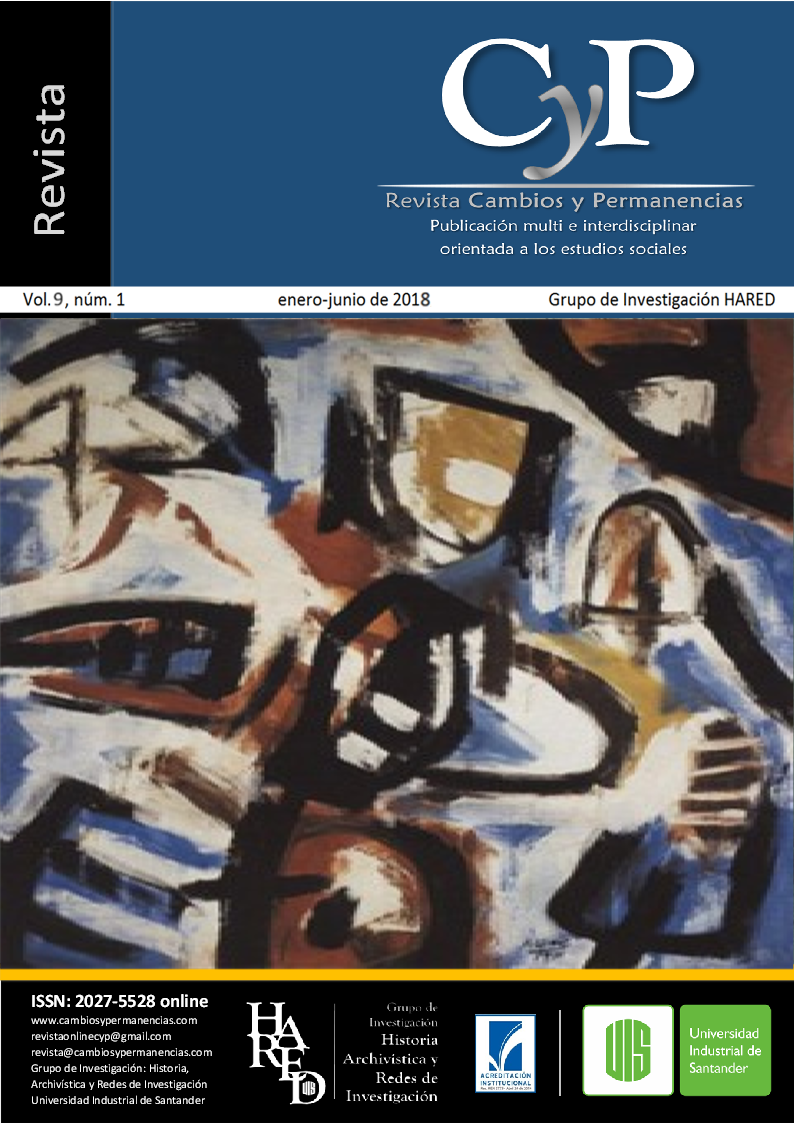Dossier: III Encuentro Nacional de Historia Oral y memoria
Ayurveda: Pedagogy to transform our legacy cultural violent and build the society of the imagination of peace
Published 2018-06-01
Keywords
- Ayurveda,
- ontology of the present,
- life,
- democratic formation
How to Cite
Cárdenas, C. E. (2018). Ayurveda: Pedagogy to transform our legacy cultural violent and build the society of the imagination of peace. Cambios Y Permanencias, 9(1), 851–866. Retrieved from https://revistas.uis.edu.co/index.php/revistacyp/article/view/8466
Abstract
The consolidation of peace in the post-agreement scenario, requires that the school deploy concrete actions that beyond making students aware of the rights and obligations they have, make them something experiential. The postulates of Enrique Dussel and Carlos Eduardo Maldonado have been used to propose the Ayurveda pedagogy as a bet of citizen education that answers the question What to do from my classroom practice to influence the gestation of a new society, where life is the first value?
Downloads
Download data is not yet available.
References
Cárdenas, C; Corredor, G. (2001). Nuestro legado cultural violento. Una propuesta. Trabajo de grado no publicado de Especialista en Derechos Humanos. Universidad el Bosque.
Cárdenas, C. y Soto, O. (2016). Propuesta de sensibilización docente para educación en derechos humanos en el Colegio Las Américas IED en el marco del Acuerdo Distrital 125/2004. Recuperado de https://www.google.com.co/url?sa=t&rct=j&q=&esrc=s&source=web&cd=8&cad=rja&uact=8&ved=0ahUKEwiCgvnaiOXOAhXGsh4KHY-SBKcQFgg3MAc&url=http%3A%2F%2Frepository.unilibre.edu.co%2Fbitstream%2Fhandle%2F10901%2F8396%2FTESIS%2520PROFESORA%2520CARMEN%2520ELISA%2520(VERSI%25C3%2593N%2520OCT%252019%2520(1).pdf%3Fsequence%3D1&usg=AFQjCNGf_9bWBCl0FZIA_OW1rTDgbg9i1Q&sig2=H9QrLVj9n7g-40wrsdLBHQ&bvm=bv.131286987,d.eWE
Centro de memoria histórica (2012). Basta ya, Colombia: memorias de Guerra y Dignidad. Recuperado de http://www.centrodememoriahistorica.gov.co/micrositios/informeGeneral/descargas.html
Constante, A. (2010). La textura del infierno en: Revista Carta psicoanalítica. Recuperado de https://www.google.com.co/url?sa=t&rct=j&q=&esrc=s&source=web&cd=1&cad=rja&uact=8&ved=0ahUKEwjY0aWCh-XOAhVMmh4KHY73BSMQFggcMAA&url=http%3A%2F%2Fwww.cartapsi.org%2Fspip.php%3Farticle155&usg=AFQjCNH5Tm3bfzN7EBKyGe5RTyv4EVNXag&sig2=n029J3eq-35iiUaGQfCF7g
Deleuze, G. (1987). Foucault. Barcelona. Paidós.
Dussel, E. (2006). 20 tesis de política. Recuperado de http://www.ceapedi.com.ar/imagenes/biblioteca/libros/282.pdf
Gil, J. (2012). El teatro es el único arte en el que la humanidad de enfrenta a sí misma. Diario Hoy. Recuperado de http://zalamea.hoy.es/actualidad/2012-10-04/teatro-unico-arte-humanidad-enfrenta-0833.html
Maldonado, C. (2010). Hacia una fundamentación filosófica de los derechos humanos. Bogotá. Universidad del Rosario.
Personería. (2013). Gandhi. Recuperado de http://personeriabogota.gov.co//images/libros_web/Mahatma%20Gandhi%202da%20Edicion.pdf
Cárdenas, C. y Soto, O. (2016). Propuesta de sensibilización docente para educación en derechos humanos en el Colegio Las Américas IED en el marco del Acuerdo Distrital 125/2004. Recuperado de https://www.google.com.co/url?sa=t&rct=j&q=&esrc=s&source=web&cd=8&cad=rja&uact=8&ved=0ahUKEwiCgvnaiOXOAhXGsh4KHY-SBKcQFgg3MAc&url=http%3A%2F%2Frepository.unilibre.edu.co%2Fbitstream%2Fhandle%2F10901%2F8396%2FTESIS%2520PROFESORA%2520CARMEN%2520ELISA%2520(VERSI%25C3%2593N%2520OCT%252019%2520(1).pdf%3Fsequence%3D1&usg=AFQjCNGf_9bWBCl0FZIA_OW1rTDgbg9i1Q&sig2=H9QrLVj9n7g-40wrsdLBHQ&bvm=bv.131286987,d.eWE
Centro de memoria histórica (2012). Basta ya, Colombia: memorias de Guerra y Dignidad. Recuperado de http://www.centrodememoriahistorica.gov.co/micrositios/informeGeneral/descargas.html
Constante, A. (2010). La textura del infierno en: Revista Carta psicoanalítica. Recuperado de https://www.google.com.co/url?sa=t&rct=j&q=&esrc=s&source=web&cd=1&cad=rja&uact=8&ved=0ahUKEwjY0aWCh-XOAhVMmh4KHY73BSMQFggcMAA&url=http%3A%2F%2Fwww.cartapsi.org%2Fspip.php%3Farticle155&usg=AFQjCNH5Tm3bfzN7EBKyGe5RTyv4EVNXag&sig2=n029J3eq-35iiUaGQfCF7g
Deleuze, G. (1987). Foucault. Barcelona. Paidós.
Dussel, E. (2006). 20 tesis de política. Recuperado de http://www.ceapedi.com.ar/imagenes/biblioteca/libros/282.pdf
Gil, J. (2012). El teatro es el único arte en el que la humanidad de enfrenta a sí misma. Diario Hoy. Recuperado de http://zalamea.hoy.es/actualidad/2012-10-04/teatro-unico-arte-humanidad-enfrenta-0833.html
Maldonado, C. (2010). Hacia una fundamentación filosófica de los derechos humanos. Bogotá. Universidad del Rosario.
Personería. (2013). Gandhi. Recuperado de http://personeriabogota.gov.co//images/libros_web/Mahatma%20Gandhi%202da%20Edicion.pdf


